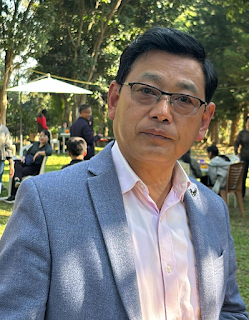Art 371 (A) : "If we don't act, we may become Uganda", says Theja
New Delhi
"Those in power will continue with their greed, it's time for people to expose such elements and their conspiracy; otherwise, the Naga story in the state of Nagaland is heading towards virtual collapse," said social activist Theja Therieh.
Asked to comment on the recent controversies related to Article 371 (A) as started following Lok Sabha MP Tokheho Yepthomi's statement, he said, "If we don't wake up from the slumber, who knows, we may become Uganda or Sri Lanka". Explaining further on the issue and the 'intent' of his remarks, the former Speaker, NSF and NTC leader, said:
"There is a deep conspiracy among the people in power to satisfy their greed under the clouds of the present political situation. This has prevented bold and transparent translation of the provisions making the only protective Article of the India Constitution (Art 371-A) vulnerable and ineffective to achieve its objectives for Nagaland".
To a question, he said, "We Nagas are no longer confused... We are lethargic. Thanks to socio-political leadership, Nagas did not want to work hard in the 1990s when we launched the Superannuation movement. Today it is worse, Nagas do not want to even think....Any Article of the Constitution of India requires to be amended from time to time in tune with the changes of circumstances".
Elaborating further, he said, "Article 371 (A) requires fortification with rectifications through amendments. That's how constitutional laws work....The simple reason for Nagaland is that the Article 371(A) is not like Article 370 of Kashmir. The Centre cannot abrogate unilaterally.
But there is a catch, it cannot be amended without political negotiations between the two entities -- that's the Naga people or through the state of Nagaland and the Central government".
"Nagas are still not realizing that the present Political Negotiations between the Naga national workers and the Govt of India are very crucial. The state has suffered in the absence of political will on the part of the elected members and the state functionaries to explore ways and means to reap the full benefit of the provisions and rendering Article 371A, a burden".
Now whether Article 371 (A) is a stumbling block to developmental and economic activities or not is "understandable", he remarked.
"But now it is time, the state functionaries and legislators and CSO leaders need to explore ways and means to devise mechanisms to utilize the core protective Article of the constitution of India by taking policy decisions to translate the provisions on the ground that can derive the maximum benefit out of the special provisions at this given situation".
The Article 370 in Jammu and Kashmir was made a 'temporary provision' from the beginning, but the Article 371 (A) for Nagaland is derived from a political agreement between the two entities and Nagaland State was born out of that political agreement. "We should know our rights and responsibilities as well".
ends





No comments:
Post a Comment